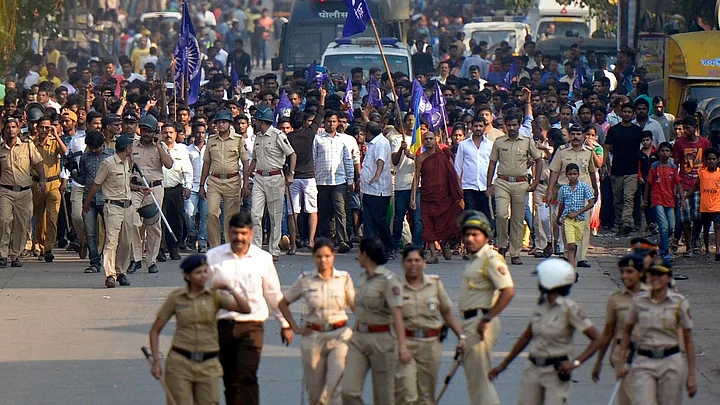The mutiny of 1857 led to the transfer of the government of British India from the East India Company to the monarch of England. The events of 1857 also spurred the British into enacting the Indian Penal Code of 1860 which had been lying in draft form for the previous almost three decades. Upon creating a code of offences applicable to the territories of British India, it was imperative for the crown to regulate law enforcement.
This need led to the enactment of the Police Act of 1861 for the purpose of reorganisation of police to increase crime prevention and investigation efficiency.
Importantly, constitution of the police establishment was left in the hands of the local government in various parts of British India. In 1937, the term ‘local government’ was replaced by the term ‘provincial government’ to keep up with administrative reorganisation within British India.
Therefore, it is important to note that even before the Constitution of India came into force, British India had placed police establishments in the hands of local and provincial governments akin to a federal structure.
Law and Order in Post Independent India
After independence, the Constitution of India in its seventh schedule placed the power to make laws regarding public order and police with the state governments. The only concurrent power in this regard shared by the states and the central government pertained to preventive detention alone.
Accordingly, underlining the control of police by state governments, the Adaptation of Laws Orders of 1950 replaced the term ‘provincial government’ in the Police Act, 1861 with the term ‘state government’ in line with the constitutional scheme.
Changes After 26/11
In the wake of the 26/11 Mumbai terror attack, the central government established the National Investigation Agency (NIA) via a namesake statute which was enacted “notwithstanding anything contained in the Police Act, 1861” while conveniently ignoring that it may not have the power to do so under the Constitution.
At a time when emotions were running high, no one challenged this enactment before any constitutional court thereby permitting the government to set up a federal law enforcement agency to investigate crimes against the sovereignty and integrity of India, including acts of terrorism (offences specified in the schedule to the Act).
The Agency was also granted extra-territorial jurisdiction over Indian citizens even if they were outside the territory of India.
What are the Provisions for NIA Taking Over Case?
The NIA Act mandates that when a scheduled offence has allegedly occurred, the officer-in-charge of the location of the alleged offence must forward a report regarding the offence to the state government which must in turn forward it to the central government. The central government is then mandated to decide within 15 days of receipt of the report to whether a schedule offence has likely occurred and whether it is a fit case for NIA to investigate.
This mechanism must have already been followed by Maharashtra police and government in the Bhima Koregaon case and the central government clearly formed an opinion that the case does not require an investigation by the NIA.
Having taken the decision not to direct an NIA investigation within 15 days of receipt of the report from the Maharashtra government, this mechanism stands exhausted.
However, and probably unconstitutionally, the NIA Act also empowers the central government to take over any investigation related to scheduled offences (including UAPA), from the state government, without its consent, and hand it over to the NIA.
This eliminates state’s control over the investigation and trial. This power overrides the mechanism which requires state governments to consent to a NIA investigation.
Exercising this arguably unconstitutional power, the central government recently handed over the Bhima Koregaon case and investigation to the NIA from the Maharashtra police at a time when the newly elected state government declared its intention of reviewing the investigation and prosecution.
A question which now arises is that having decided at one stage that the case does not require NIA investigation, can the central government revisit this position and exercise its extraordinary power of suo moto transferring investigations to NIA?
Having done so, it is imperative on the central government to reveal the reasons for the change in its opinion and whether it is based on new material which did not exist at the time of the first decision. If the recent decision is based on the same material on which its original decision was based then the question which will have to be decided by the court is whether the overriding power granted to the central government can be invoked in such a case.
This is a disturbing attack on a state government’s power coming at a time when the State of Chhattisgarh has challenged the constitutional validity of the NIA Act.
The INC government of Chhattisgarh has challenged the validity of a law enacted by the UPA by filing a suit against the central government under article 131 of the Constitution of India. It may be worthwhile for the State of Maharashtra to also join cause with the Chhattisgarh government by challenging the constitutional validity of transfer of the Bhima Koregaon case to NIA.
Interestingly, the Gauhati High Court had in 2013 had quashed a 1963 Resolution which created the Central Bureau of Investigation (CBI) under the Delhi Special Police Establishment Act, 1946 and declared all of CBI’s actions as unconstitutional. The Supreme Court at an emergency hearing before the then CJI at his residence stayed the operation of the High Court judgment.
The appeal is still pending before the Supreme Court. The challenge to the NIA Act will cause further scrutiny of the laws which established federal law enforcement agencies.
(Chitranshul Sinha is a lawyer practicing in the Supreme Court. He tweets using the handle @ghair_kanooni. This is an opinion piece and the views expressed above are the author’s own. The Quint neither endorses nor is responsible for the same.)
